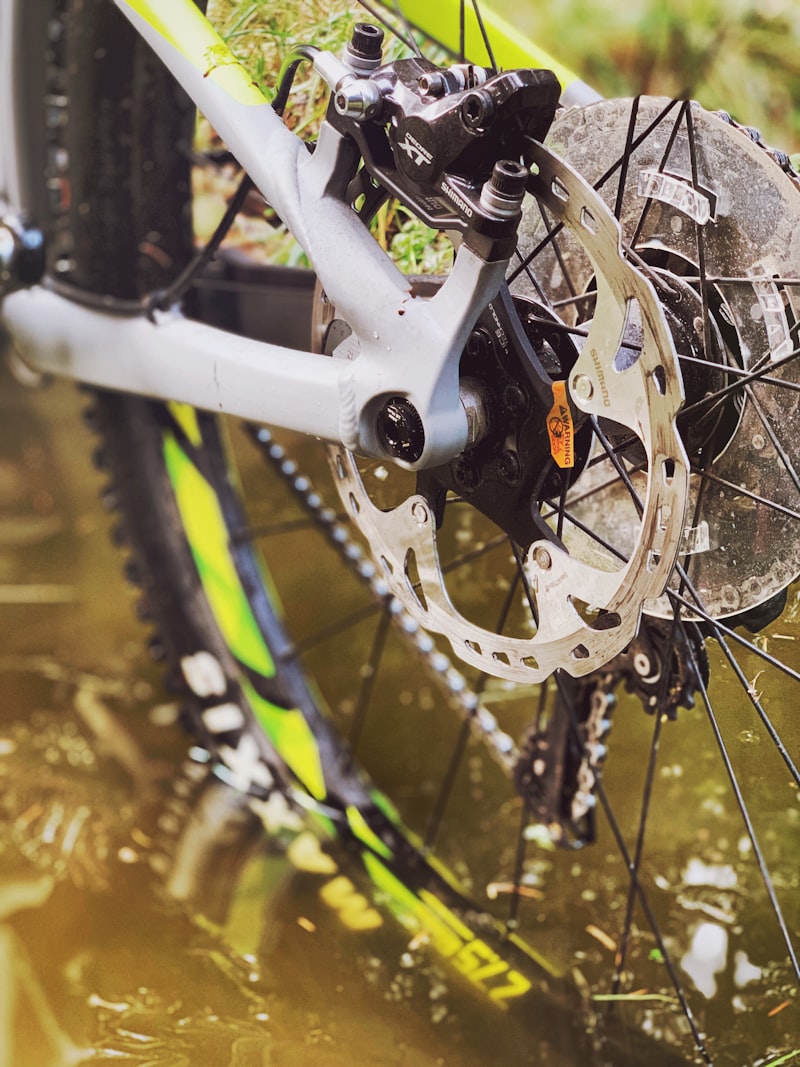Why should you care about brake inspections? Well, imagine your car’s brake system is like a finely tuned orchestra. Each component, from brake pads to rotors, plays a crucial role in ensuring your vehicle stops effectively and safely. Over time, these components wear down due to friction and heat, potentially compromising your braking efficiency. Regular inspections help catch these issues early, preventing costly repairs down the road.
Think of brake inspections as preventive maintenance. By regularly checking your brakes, you not only ensure your safety but also save money in the long run. Catching a worn brake pad early can prevent it from damaging the rotor, which is more expensive to replace. It’s like changing the oil in your car regularly—small investments now can prevent big headaches later.
Another benefit of regular brake inspections is peace of mind. Knowing that your brakes are in optimal condition gives you confidence on the road, especially during emergencies. It’s like having a reliable safety net—you may never need it, but it’s reassuring to know it’s there.
But how often should you get your brakes inspected? It depends on your driving habits and the manufacturer’s recommendations. Typically, brake inspections are recommended every 12,000 to 15,000 miles, but heavy stop-and-go traffic may require more frequent checks.
Safe Travels Ahead: Why Regular Brake Inspections Are Crucial
Picture this: you’re cruising down the highway, wind in your hair, music blaring, and suddenly, you need to hit the brakes. You press down, expecting a smooth slowdown, but instead, there’s a delay. It’s a heart-stopping moment, isn’t it? That’s why regular brake inspections are not just important—they’re absolutely crucial for safe travels.
Your brakes are your car’s best friend when it comes to keeping you safe on the road. They work tirelessly, quietly ensuring you can stop when you need to, whether it’s for a sudden red light or a surprise crossing animal. But just like any superhero, they need a check-up now and then to stay in top shape.
Think about it this way: your brakes endure a lot of heat, pressure, and friction every time you use them. Over time, this wear and tear can lead to brake pads wearing down, brake fluid leaking, or even brake rotors warping. Without regular inspections, these issues can escalate, putting you at risk of brake failure when you least expect it.
So, what happens during a brake inspection? A skilled technician will meticulously check every component of your braking system. They’ll inspect the brake pads to ensure they’re thick enough, examine the brake fluid for any signs of contamination or low levels, and assess the brake rotors for wear and tear. It’s like giving your brakes a thorough health check-up.
But it’s not just about preventing a sudden brake failure. Regular inspections can also save you money in the long run. By catching small issues early, you avoid more extensive repairs down the road. Plus, well-maintained brakes can improve your car’s overall performance and fuel efficiency, which means more savings for you at the pump.
Ultimately, when it comes to your safety and the safety of those around you, regular brake inspections are non-negotiable. They ensure that your brakes are ready to spring into action whenever you need them, providing you with peace of mind on every journey.
Save Money, Stay Safe: The Financial and Safety Benefits of Routine Brake Checks
Are you overlooking one of the simplest ways to save money and stay safe on the road? Routine brake checks might not be on your regular to-do list, but they can significantly impact your wallet and your well-being. Here’s why paying attention to your brakes matters more than you might think.
First off, let’s talk about the financial side. Picture this: you’re cruising down the highway, enjoying the drive, when suddenly you hear a high-pitched squeal every time you hit the brakes. That sound? It could mean your brake pads are worn down, and if ignored, it could lead to more extensive damage. By regularly inspecting and maintaining your brakes, you can catch issues early on. This preventative approach not only saves you from costly repairs down the road but also extends the lifespan of your braking system, meaning fewer trips to the mechanic.
Now, let’s shift gears to safety. Your brakes are your first line of defense on the road. Whether it’s a surprise red light or a sudden stop in traffic, you need your brakes to respond swiftly and effectively. Routine checks ensure that your brakes are in optimal condition, providing you with the peace of mind that you can stop when you need to. It’s like having a reliable safety net – you hope you never need it, but you’re glad it’s there when you do.
Think of your car’s braking system like the heart of your vehicle. It needs regular check-ups to keep pumping efficiently. When you neglect maintenance, you risk not only your safety but also your bank account. After all, a small investment in routine brake checks today can prevent a larger financial setback tomorrow.
So, the next time you’re due for an oil change or tire rotation, consider adding a brake check to your list. It’s a simple step that can save you money, keep you safe, and ensure your car stays on the road where it belongs.
Behind the Wheel: How Regular Brake Inspections Enhance Driver Confidence
Your brakes are like the unsung heroes of your car, quietly ensuring your safety mile after mile. But how do regular brake inspections play into this narrative of trust and control? It’s simple: they’re the proactive measure that keeps you ahead of potential issues.
Think of your brakes as a finely tuned orchestra. Each component—the pads, rotors, calipers, and fluid—plays a crucial role in harmony. Over time, though, wear and tear can quietly creep in, affecting performance. Regular inspections nip these issues in the bud before they become a major symphony of problems.
Picture this: you press down on the brake pedal, and your car responds instantly, smoothly coming to a halt. That’s the confidence regular brake inspections bring. They ensure that when you need to stop, your vehicle does so predictably and safely, whether you’re navigating city streets or cruising down the highway.
Moreover, regular inspections save you money in the long run. By catching minor issues early, you avoid costly repairs that can result from neglected brake maintenance. It’s like fixing a small crack in your windshield before it spreads across the glass—a stitch in time saves nine.
So, next time you consider skipping that routine brake check, remember: it’s not just about maintaining your vehicle; it’s about maintaining your peace of mind. Knowing your brakes are in top condition allows you to focus on enjoying the journey, confident that you can handle whatever the road throws your way.
Regular brake inspections aren’t just about keeping your car running smoothly—they’re about keeping you in control. When your brakes are in peak condition, you can drive with the assurance that you’re prepared for whatever lies ahead.
Preventative Care: The Long-Term Advantages of Routine Brake Maintenance
When it comes to car maintenance, routine brake checks might not be the first thing that comes to mind, but they are crucial for your safety and the longevity of your vehicle. Imagine your car as an athlete—the brakes are like the shoes that allow them to stop and maneuver effectively. Without proper care, those shoes wear out faster, compromising performance when you need it most.
Routine brake maintenance is more than just a precaution; it’s a smart investment in the future of your car and your peace of mind. By regularly inspecting and servicing your brakes, you ensure they are functioning optimally. This proactive approach not only prevents sudden breakdowns but also extends the lifespan of your braking system components.
Picture this: you’re driving down a steep hill, enjoying the scenery, when suddenly a deer crosses the road. Your ability to stop swiftly and safely depends on the condition of your brakes. Well-maintained brakes respond instantly, allowing you to avoid accidents. It’s like having a reliable partner who anticipates your every move—precise and dependable.
Moreover, routine brake maintenance saves you money in the long run. By catching small issues early, you prevent them from escalating into costly repairs. Think of it as treating a small crack in your home’s foundation before it turns into a major structural issue—addressing it promptly saves you from extensive damage and expenses.
But it’s not just about the financial aspect. Knowing that your brakes are in top shape provides peace of mind. Whether you’re driving through busy city streets or on winding country roads, you can navigate with confidence, knowing your car will stop precisely when you need it to.
Routine brake maintenance isn’t just about keeping your car in good shape; it’s about ensuring your safety and saving money over time. So, don’t wait for the warning signs—schedule a brake check today and keep your vehicle performing at its best for miles to come.
Brake Inspections Demystified: What Every Driver Should Know
When it comes to vehicle safety, few things are as critical as ensuring your brakes are in top condition. Brake inspections play a crucial role in maintaining both safety and peace of mind on the road. But what exactly should every driver know about brake inspections?
Firstly, understanding the timing of brake inspections is key. Experts recommend having your brakes checked at least once a year, or every 12,000 miles, whichever comes first. However, if you notice any signs of brake issues such as squeaking, grinding, or a soft brake pedal, it’s essential to get them inspected immediately. Ignoring these signs could lead to more significant problems and compromise your safety.
During a brake inspection, certified technicians will thoroughly assess several key components. They will inspect the brake pads to ensure they are not worn down beyond safe limits. Brake rotors will be checked for signs of warping or damage that could affect braking performance. Additionally, brake fluid levels and condition will be examined, as proper fluid levels are crucial for effective braking.
One of the critical aspects of a brake inspection is the visual and operational checks. Technicians will visually inspect the brake system for any visible leaks or damage. They will also conduct operational tests to evaluate the brake system’s responsiveness and effectiveness. This thorough approach ensures that all aspects of your vehicle’s braking system are scrutinized for optimal performance.
Drivers often wonder about the cost of brake inspections. While prices can vary depending on your location and vehicle model, the cost of a routine brake inspection is a wise investment compared to the potential costs and dangers of brake failure.


Staying proactive with brake inspections is key to vehicle safety. By understanding the importance of regular inspections and knowing the signs that indicate brake issues, drivers can ensure their brakes are always ready to perform when needed most. Whether it’s the squeak of worn brake pads or the smooth operation of a well-maintained brake system, keeping your brakes in top shape is essential for a safe driving experience.
Stop on a Dime: The Performance Benefits of Well-Maintained Brakes
Imagine cruising down the road, wind in your hair, and suddenly, you need to stop—fast. That’s where well-maintained brakes come into play. Your car’s brakes are not just a necessity; they’re your safety net, your lifeline when the unexpected happens.
Well-maintained brakes offer a host of performance benefits that go beyond just stopping power. They provide confidence—knowing that when you hit the pedal, your car will respond promptly and efficiently. Imagine trying to avoid an obstacle with worn-out brakes versus ones that grip the rotors like a vice.
But it’s not just about safety. It’s also about smoothness and control. Brakes that are properly maintained ensure a seamless transition from speed to stop, almost like a dancer gliding across the floor. They allow you to stop precisely where you need to, whether it’s at a traffic light or to avoid a hazard on the road.
Think of it this way: well-maintained brakes are like the conductor of an orchestra. They coordinate the symphony of your drive, ensuring each movement is precise and harmonious. When you press down, they respond instantly, bringing your car to a halt with the finesse of a maestro’s baton.
Moreover, they contribute to the longevity of your vehicle. By preventing wear and tear on other components, like the tires and suspension, they help your car stay in top shape for longer. It’s an investment not just in safety but in the overall health of your vehicle.
In essence, well-maintained brakes are more than just a necessity; they’re a performance enhancer. They give you the confidence to navigate any road with ease and precision, ensuring that your driving experience is not only safe but smooth and enjoyable.
Frequently Asked Questions
Why are regular brake inspections important?
Regular brake inspections are crucial to ensure optimal vehicle safety and performance. They help identify potential issues early, such as worn brake pads or brake fluid leaks, preventing costly repairs and ensuring reliable braking efficiency. Routine inspections also enhance driver confidence by maintaining consistent braking responsiveness and reducing the risk of accidents.
What are the benefits of preventive brake maintenance?
Learn about the advantages of preventive brake maintenance, ensuring safe and efficient vehicle operation. Regular maintenance reduces the risk of brake failure, extends brake system lifespan, enhances overall driving safety, and saves on repair costs.
How often should I get my brakes inspected?
Regular brake inspections are recommended every 12,000 to 15,000 miles or as advised by your vehicle’s manufacturer. This helps ensure optimal brake performance and early detection of potential issues.
How can regular brake inspections save me money in the long run?
Learn how regular brake inspections can save you money over time by preventing costly repairs and ensuring your vehicle’s safety and performance.
What are the signs that indicate I need a brake inspection?
Learn to recognize signs that indicate you need a brake inspection, such as squealing or grinding noises, pulsating brake pedal, longer stopping distances, or dashboard brake warning light.



